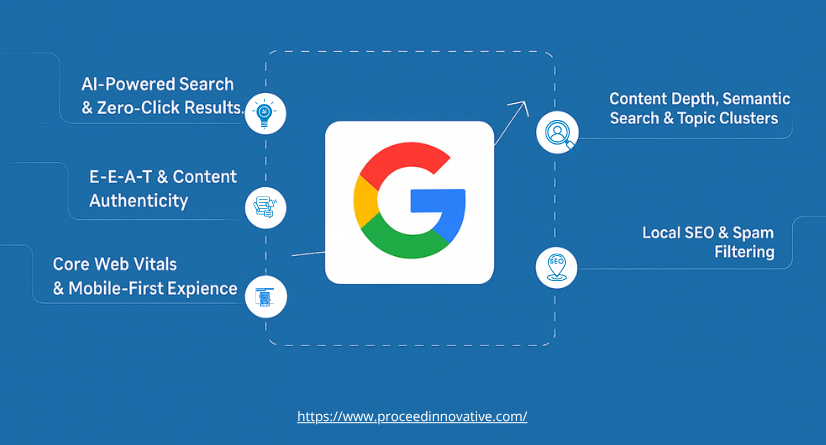As we move into the second half of the year, Google is rolling out two major search updates that will impact the sites’ ranking—the already ongoing June 2025 Core Update and the soon-to-be-launched July 2025 Algorithm Update. Being an owner of a business, SEO specialist, or content producer, it is important for you to know these updates so that you can guarantee and extend your online existence.
In this article, we’ll break down:
- What the June and July 2025 updates include
- What’s changing in how Google evaluates content
- How you can adjust your SEO strategy to stay ahead
Understanding the June & July 2025 Google Updates
June 2025 Core Update
This broad core update, which was Rolled out on June 30, 2025, is focused on improving Google’s ability to locate helpful, high-quality content across all industries. The rollout will occur in up to three weeks and is likely to cause ranking fluctuations across the majority of sites.
July 2025 Algorithm Update
Scheduled to follow the core update, the July 2025 launch is designed to focus more on content quality, user experience, and AI-driven content evaluation—all core pillars in Google’s evolving way of ranking web pages.
Key Focus Areas in July 2025
1. Quality Content Evaluation
Google continues to reward content that displays:
- Depth of knowledge
- Alignment with user search intent
- Clear expertise, experience, authority, and trustworthiness (E-E-A-T)
Thin, aging, or low-value content on thin pages can be demoted in visibility. If your content is not helping users or responding to real questions, it’s time for a revamp.
2. AI-Driven Content Understanding
Google is becoming more artificial intelligence and machine learning-powered. Why? To enhance the recognition of context, tone, and content value—more than keywords. Improved fluff content vs. actual-quality information identification is coming.
3. Mobile-First Indexing
Since more searchers are using mobile devices, your mobile site is actually your main site in Google. Bad mobile usability, slow loading, or clunky design could hurt rankings. Performance audit with Google’s Mobile-Friendly Test.
4. User Experience (UX) Signals
User behavior matters more than ever. Google is closely watching:
- Loading speed
- Easy Navigation
- Core Web Vitals
- Ad intrusion levels
Pages with fast, smooth, and ad-light experiences are more likely to rise in rankings.
5. Crackdown on Spam & Manipulative Tactics
Google will continue penalizing sites that engage in:
- Keyword stuffing
- Buying backlinks
- Cloaking or misleading redirects
Comply with clean SEO practices, they’re not only more secure but are also more efficient in the long run.
6. Featured Snippets Enhancements
Featured snippets (Position 0) are becoming competitive. Simple, direct answers to user queries, especially using structured lists, tables, or FAQs, can enhance your possibility of gaining this prized real estate.
What to Monitor During the Update Rollouts
As the updates continue rolling out into July, be sure to:
- Track ranking changes on high-priority keywords
- Watch organic traffic trends in Google Analytics
- Check Google Search Console for shifts in impressions and clicks
- Compare competitor performance for industry-wide patterns
Avoid quick changes during the rollout. Rankings often fluctuate before stabilizing.
How to Prepare & Stay Competitive
Audit and Update Content
- Refresh outdated posts
- Add expert insights and credible sources
- Align content to solve user problems or answer real questions
Optimize Mobile Experience
- Improve page speed (under 2.5 seconds)
- Eliminate pop-ups that disrupt navigation
- Use responsive design
Boost UX and Core Web Vitals
- Compress images and streamline code
- Avoid heavy ad loads or auto-playing videos
- Make CTAs and site navigation intuitive
Follow Google’s Webmaster Guidelines
- Focus on earning organic backlinks through quality content
- Remove or disavow low-quality or spammy backlinks
Implement Structured Data (Schema Markup)
- Use schema to enhance rich results (FAQs, reviews, events, etc.)
- Improve clarity for Google’s crawlers and voice assistants
Final Thoughts
Google algorithm changes in July 2025 will continue to propel the web in the direction of usefulness, quality, and trust. Whether you’re refining content, improving UX, or paring down your mobile design, a user-first approach will future-proof your SEO plan.
Need Expert Local SEO Help?
At Proceed Innovative, we specialize in helping businesses stay ahead of Google’s updates. From content audits to SEO strategy and performance tracking—we’ve got your back. Let’s talk. Contact us today and discover how to build lasting visibility in a changing search landscape.






